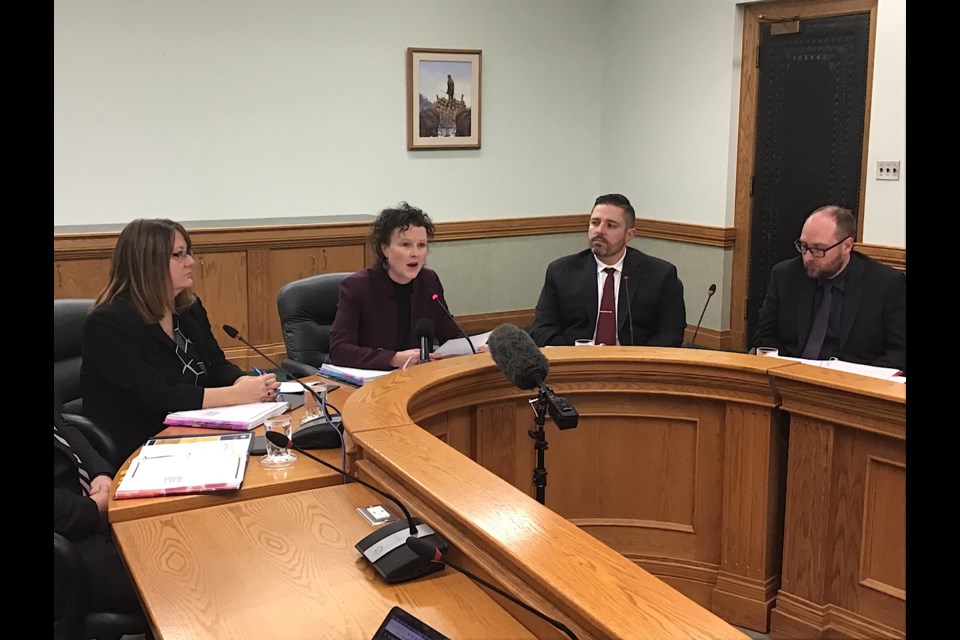REGINA - Provincial Auditor Tara Clemett has released Volume 2 of her 2022 Report, and there are a few things to know.
The report included findings on a number of areas including the Saskatchewan Health Authority processes to fill hard-to-recruit health care positions; the Ministry of Corrections Policing and Public Safety processes regarding segregation of inmates; the Ministry of Finance and processes on PST Compliance; and on the Saskatchewan Cancer Agency and the SGI licensing of commercial drivers.
Saskatchewan Health Authority Recruiting
The Provincial Auditor made recommendations on SHA processes to fill hard to recruit positions. Her report noted that there were 2,200 staff shortages expected at hard to recruit positions over the next five years, and the report also noted that 66 per cent of SHA staff survey respondents felt burned out.
Her report found that SHA will need to continually implement and monitor targeted plans to fill hard to recruit positions, and need to analyze facilities that need the help the most. The SHA also needs to determine the optimal supply of new graduates needed to address staffing shortfalls, and whether post-secondary training seats purchased out of province and student clinical placements are successful recruitment strategies.
Clemett also said the SHA requires a First Nations and Métis recruitment and retention plan, and also needs to centrally analyze the results from staff exit interviews as this may provide insight into why staff are leaving.
“Retaining qualified staff is more cost effective than continually recruiting, training and orienting new ones,” said Clemett.
Ministry of Finance - PST Compliance
Clemett made recommendations on Ministry of Finance processes to enforce compliance with provincial sales tax legislation. This audit was done, she said, because PST accounts for 30 per cent or over $2 billion of total provincial tax revenue.
According to her report, Finance needs to analyze key trends in non-compliance with PST legislation to help prioritize enforcement activities; enhance its reporting to senior management to better analyze PST enforcement result; document key judgements when selecting taxpayers (vendors) for PST audits, and set out time frames for reviewing audits and enforcement activities.
Corrections, Policing and Public Safety
This particular audit focused on Corrections, Policing and Public Safety’s processes to administratively segregate inmates in its adult secure custody correctional facilities.
According to the audit report, the Ministry had placed 49 inmates on administrative segregation in 2021, with over half due to violent or aggressive behavior. 13 of them were on administrative segregation greater than 15 days in a row ranging from 16 to 43 days. Clemett said good practice suggests segregation should not go on longer than 15 days.
Her report noted the need for the ministry to have appropriate staff authorize administrative segregation placement decisions as required. It also found nurses must complete periodic health care assessments to evaluate each inmate’s mental and physical ability to cope with segregation and make recommendations about the inmate’s placement on segregation. “This wasn’t always happening as required,” said Clemett.
The report also notes the ministry needs to develop a training plan and enhance written reports to senior management and the public about the use of administrative segregation. “Unneccessary and prolonged segregation may leave vulnerable inmates with possible mental and physical health damage,” said Clemett.
Cancer Drug Supply Management
The auditor’s report found the Saskatchewan Cancer Agency had effective processes to manage its supply of cancer drugs but needs to improve in a few areas. The report noted these include setting time frames or make decisions on drug exemption requests to facility timely treatment, and formally documenting its processes for getting approved cancer drugs on the drug formulary, along with documenting certain processing decisions.
Licensing Commercial Drivers
Clemett also examined SGI’s processes to license commercial Class 1 drivers, particularly the mandatory entry-level training or MELT introduced in March 2018.
It was noted in May, 2022, out of 62,000 commercial Class 1 drivers in Saskatchewan, 2,800 had taken the MELT course.
Further improvements include periodically evaluating the effectiveness of MELT and sufficiently confirming its Class 1 road test examiners meet the requirements to be examiners.
Follow up audits
There were also 13 follow-up audits in the auditor’s report, including in Chapter 15 of the report which focuses on eHealth Saskatchewan securing portable computing devices.
Clemett noted portable devices such as laptops and smartphones are attractive targets for attackers. She said eHealth has to further enhance its security settings to protect those devices from viruses and malware, and also said sufficiently controlling and monitoring access to the eHealth IT network will also mitigate the impact of security breaches when they do happen.
Clemett also pointed to Chapter 20 of the report, where it was noted the SHA has more work to do to maintain health care facilities in Saskatoon and surrounding areas.
Clemett reported that overall, SHA facilities are in critical condition and getting worse. She reported the SHA hasn’t set measurable service objectives to determine which facilities and components are in immediate need of maintenance, and not completing preventative maintenance on a consistent basis.
This increases the risk that key facilities and components go unprepared, or that an asset may fail and cause harm to residents, patients, visitors and staff.






